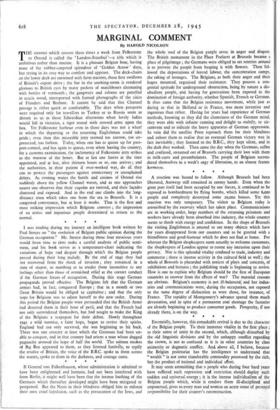If General von Falkenhausen, whose administration is admitted to have
been enlightened and humane, had not been interfered with from Berlin, it might well have been that the intense loathing of the Germans which thereafter developed might have been mitigated or postponed. But the Nazis in their blindness obliged him to enforce their own cruel legislation, such as the persecution of the Jews, and
the whole soul of the Belgian people arose in anger and disgust. The British monument in the Place Poelaert at Brussels became a place of pilgrimage ; the Germans were obliged to set sentries around it to prevent the people from heaping it with flowers. Then 'fol- lowed the deportations of forced labour, the concentration camps, the taking of hostages. The Belgians, as both their anger and their hopes mounted, organised their resistance. They possess a con- genital aptitude for underground obstruction, being by nature a dis- obedient people, and having for generations been exposed to the domination of foreign authority, whether Spanish, French or German. It thus came that the Belgian resistance movement, while just as daring as that in Holland or in France, was more inventive and ingenious than either. Having for years had experience of German methods, knowing as they did the clumsiness of the German mind, they were able with infinite cunning and delight to stultify, to cir- cumvent and to ridicule the heavy apparatus of German oppression. In vain did the satellite Press reproach them for their blindness and exhort them to realise that an eventual German victory was in fact inevitable ; they listened to the B.B.C., they kept silent; and in the dark they worked. Then came the day when the Germans, sullen and confused, streamed out of Brussels carrying their loot with them in milk-carts and perambulators. The people of Belgium surren- dered themselves to a week's orgy of liberation, to an almost frantic
kermesse.






























 Previous page
Previous page